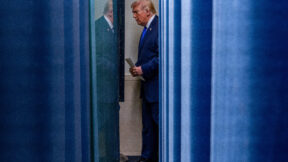Venezuelan Media Is Using AI-Generated Personalities to Shield Journalists From Government Crackdown
Content created by artificial intelligence muddies the waters of what is real and what is misinformation. But in Venezuela, AI is being used as a tool to not only tell real stories but protect the people trying to tell them.
The fallout from Venezuelan President Nicolás Maduro’s disputed election in July led to a government-driven crackdown that began when he first came to power in 2013. Since then, it has become increasingly dangerous to be a reporter in the country. Reporters Without Borders says: “Journalism is heavily restricted in Venezuela. Reporters are often beaten or threatened in the course of their work during elections or political conflicts. As President Maduro controls both the attorney general’s office and the ombudsman’s office, neither helps to guarantee the safety of journalists, with the result that physical or verbal violence against them is seldom investigated.”
But several media organizations have found a way to report the truth and protect journalists at the same time — with AI-generated avatars delivering stories written by legitimate journalists.
NBC News reported in August, about a month after the election, about how the government crackdown on free journalism resulted in one journalist being taken into custody and charged with “terrorism.” A CNN report by Stefano Pozzeban published Wednesday stated that at least 16 journalists had been detained since the election. Some journalists have left the field out of fear.
As a result, Operation Retweets was born. Using news readers created with artificial intelligence — La Chama, or “The Girl,” and El Pana, “The Dude” — real reporters are able to do their jobs without revealing their identities. It is made clear to the viewer that both news anchors are not real people, but the stories are written by real reporters. And since many Venezuelans have turned to social media to get their news, having lost trust in compromised state-run media, Operation Retweets was designed to get the word out online:
Rather than focus on live broadcasts or written articles, its digitally created avatars simply read the news in clips that can be posted on the likes of Instagram and Facebook, or downloaded and forwarded on WhatsApp and other messaging services. (Sharing the clips on X is more problematic, as Venezuela banned the use of the app altogether when Maduro accused tech tycoon Elon Musk of being part of a neo-fascist plot to overthrow his government.)
Pozzeban also wrote that while Operation Retweets was an effective way for journalists to operate, some were skeptical that it could last:
“It’s nonsense to even think for a heartbeat that it’s a safety tool. It’s a clever idea, and I hope it lasts forever,” said Shelly Palmer, a professor of Advanced Media at Syracuse University who has worked extensively on artificial intelligence.
“But I wouldn’t want anyone to believe for a second that by creating an avatar and creating a false voice, or cloning someone else’s voice you are hiding. Not at all: you are 100% exposed. Unless you are an absolute expert in covering your tracks digitally, there’s nothing about this that is stealthy,” he told CNN.
Watch the video above via NBC News on YouTube.
New: The Mediaite One-Sheet "Newsletter of Newsletters"
Your daily summary and analysis of what the many, many media newsletters are saying and reporting. Subscribe now!






Comments
↓ Scroll down for comments ↓